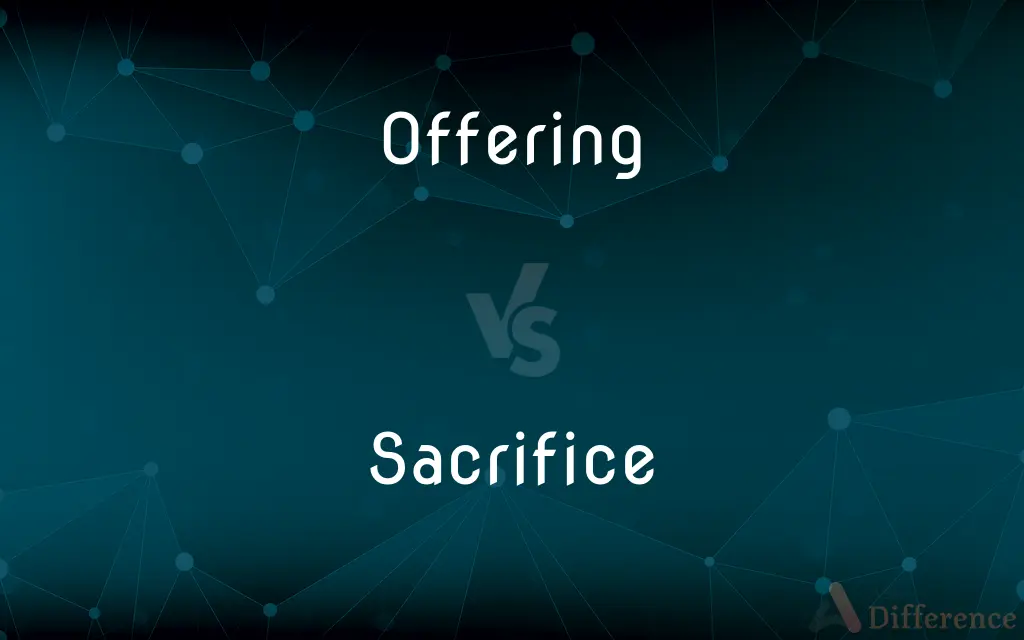Offering vs. Sacrifice — What's the Difference?
Edited by Tayyaba Rehman — By Urooj Arif — Updated on March 26, 2024
An offering is a gift or contribution given willingly, often to show respect or devotion, while a sacrifice involves giving up something valuable for the sake of others or to honor a deity.

Difference Between Offering and Sacrifice
Table of Contents
ADVERTISEMENT
Key Differences
Offerings are gifts or contributions given to express respect, devotion, or allegiance, typically in a religious or spiritual context. They are usually voluntary and can include money, goods, or services. Sacrifice, on the other hand, entails the act of giving up something valuable or important for the sake of something or someone else, often as a way to show devotion to a deity or to achieve a greater good.
While offerings can be anything given as a sign of respect or worship, sacrifices often involve a significant cost to the giver, highlighting the depth of their commitment or faith. For example, offerings can be as simple as lighting a candle in a church, whereas sacrifices might involve forgoing personal desires or even offering one's life in extreme cases.
The intention behind an offering is usually to show gratitude or devotion without necessarily expecting something in return, whereas sacrifices are often made in the hope of receiving favor or appeasement from a higher power. This difference in intention can significantly affect the nature and perception of the act.
Both offerings and sacrifices play crucial roles in various religious and cultural practices, symbolizing the relationship between the devotee and the divine. Offerings are often seen as acts of worship and thanksgiving, while sacrifices are viewed as deeper expressions of faith and submission.
The act of making an offering can be personal and reflective, requiring thoughtfulness but not necessarily sacrifice. In contrast, sacrifices demand a personal cost, sometimes involving pain or loss, underscoring the seriousness of the commitment or belief.
ADVERTISEMENT
Comparison Chart
Definition
A gift or contribution given willingly for a purpose.
Giving up something valuable for the sake of something else.
Nature
Voluntary, often without expectation of return.
Involves significant personal cost or loss.
Intention
To show respect, devotion, or support.
To honor, appease, or seek favor from a deity or principle.
Examples
Donations to a temple, lighting a candle.
Fasting, abstaining from pleasures, offering one's life.
Role in Religion/Culture
Acts of worship and thanksgiving.
Expressions of deep faith and submission.
Compare with Definitions
Offering
Can be anything given voluntarily out of respect or worship.
The offering of incense at the temple was a daily practice.
Sacrifice
The act of giving up something valuable as an offering to a deity or for a cause.
The ancient ritual involved the sacrifice of crops to ensure a good harvest.
Offering
Common in various religious practices as a sign of devotion.
The ritual offering of food to the deities is an ancient practice.
Sacrifice
Involves a significant loss or discomfort to the person making it.
Her sacrifice of personal time to volunteer at the shelter was commendable.
Offering
Can include money, goods, or services.
Volunteers made offerings of their time and skills to the community.
Sacrifice
To seek favor, forgiveness, or to fulfill a vow.
The pilgrimage was made as a sacrifice for peace and healing.
Offering
Shows gratitude or reverence without the expectation of something in return.
Their offering was a gesture of thanks for the blessings received.
Sacrifice
Seen as a deep expression of faith and submission.
Fasting during the holy month is a form of sacrifice to show devotion.
Offering
A contribution given as a sign of devotion or respect.
She made an offering of flowers at the shrine.
Sacrifice
Often more substantial or costly than offerings.
Giving up a cherished possession as a sacrifice was a true test of faith.
Offering
A thing offered, especially as a gift or contribution
Everyone transported their offerings to the bring-and-buy stall
Sacrifice
Sacrifice is the offering of material possessions or the lives of animals or humans to a deity as an act of propitiation or worship. Evidence of ritual animal sacrifice has been seen at least since ancient Hebrew and Greeks, and possibly existed before that.
Offering
The act of making an offer.
Sacrifice
The act of offering something to a deity in propitiation or homage, especially the ritual slaughter of an animal or a person.
Offering
Something, such as stock, that is offered.
Sacrifice
A victim offered in this way.
Offering
A presentation made to a deity as an act of religious worship or sacrifice; an oblation.
Sacrifice
The act of giving up something highly valued for the sake of something else considered to have a greater value or claim
Social activism often involves tremendous sacrifice.
Offering
A contribution or gift, especially one made at a religious service.
Sacrifice
Something given up in this way.
Offering
Present participle of offer
Sacrifice
Relinquishment of something at less than its presumed value.
Offering
The act by which something is offered.
Sacrifice
Something so relinquished.
Offering
That which has been offered; a sacrifice.
Sacrifice
A loss so sustained.
Offering
An oblation or presentation made as a religious act.
Sacrifice
(Baseball) A sacrifice bunt or sacrifice fly.
Offering
A contribution given at a religious service.
Sacrifice
To offer as a sacrifice to a deity.
Offering
Something put forth, bid, proffered or tendered, such as for sale
Sacrifice
To give up (one thing) for another thing considered to be of greater value.
Offering
The act of an offerer; a proffering.
Sacrifice
To sell or give away at a loss.
Offering
That which is offered, esp. in divine service; that which is presented as an expiation or atonement for sin, or as a free gift; a sacrifice; an oblation; as, sin offering.
They are polluted offerings more abhorredThan spotted livers in the sacrifice.
Sacrifice
To kill (an animal) for purposes of scientific research or experimentation.
Offering
A sum of money offered, as in church service; as, a missionary offering.
[None] to the offering before her should go.
Sacrifice
To offer a sacrifice
The Greek warriors sacrificed to their gods.
Offering
Something offered (as a proposal or bid);
Noteworthy new offerings for investors included several index funds
Sacrifice
To make a sacrifice
Parents sacrificing for their children.
Offering
Money contributed to a religious organization
Sacrifice
(Baseball) To make a sacrifice bunt or sacrifice fly.
Offering
The verbal act of offering;
A generous offer of assistance
Sacrifice
(ambitransitive) To offer (something) as a gift to a deity.
Offering
The act of contributing to the funds of a church or charity;
Oblations for aid to the poor
Sacrifice
(transitive) To give away (something valuable) to get at least a possibility of gaining something else of value (such as self-respect, trust, love, freedom, prosperity), or to avoid an even greater loss.
Sacrifice
(transitive) To trade (a value of higher worth) for something of lesser worth in order to gain something else valued more, such as an ally or business relationship, or to avoid an even greater loss; to sell without profit to gain something other than money.
Sacrifice
To intentionally give up (a piece) in order to improve one’s position on the board.
Sacrifice
To advance (a runner on base) by batting the ball so it can be fielded, placing the batter out, but with insufficient time to put the runner out.
Sacrifice
To sell at a price less than the cost or actual value.
Sacrifice
To destroy; to kill.
Sacrifice
(medicine) To kill a test animal for autopsy.
Sacrifice
The offering of anything to a god; a consecratory rite.
Sacrifice
The destruction or surrender of anything for the sake of something else; the devotion of something desirable to something higher, or to a calling deemed more pressing.
The sacrifice of one's spare time in order to volunteer
Sacrifice
(baseball) A play in which the batter is intentionally out so that one or more runners can advance around the bases.
Sacrifice
Something sacrificed.
Sacrifice
A loss of profit.
Sacrifice
A sale at a price less than the cost or the actual value.
Sacrifice
The offering of anything to God, or to a god; consecratory rite.
Great pomp, and sacrifice, and praises loud,To Dagon.
Sacrifice
Anything consecrated and offered to God, or to a divinity; an immolated victim, or an offering of any kind, laid upon an altar, or otherwise presented in the way of religious thanksgiving, atonement, or conciliation.
Moloch, horrid king, besmeared with bloodOf human sacrifice.
My life, if thou preserv'st my life,Thy sacrifice shall be.
Sacrifice
Destruction or surrender of anything for the sake of something else; devotion of some desirable object in behalf of a higher object, or to a claim deemed more pressing; hence, also, the thing so devoted or given up; as, the sacrifice of interest to pleasure, or of pleasure to interest.
Sacrifice
A sale at a price less than the cost or the actual value.
Sacrifice
To make an offering of; to consecrate or present to a divinity by way of expiation or propitiation, or as a token acknowledgment or thanksgiving; to immolate on the altar of God, in order to atone for sin, to procure favor, or to express thankfulness; as, to sacrifice an ox or a sheep.
Oft sacrificing bullock, lamb, or kid.
Sacrifice
Hence, to destroy, surrender, or suffer to be lost, for the sake of obtaining something; to give up in favor of a higher or more imperative object or duty; to devote, with loss or suffering.
Condemned to sacrifice his childish yearsTo babbling ignorance, and to empty fears.
The Baronet had sacrificed a large sum . . . for the sake of . . . making this boy his heir.
Sacrifice
To destroy; to kill.
Sacrifice
To sell at a price less than the cost or the actual value.
Sacrifice
To make offerings to God, or to a deity, of things consumed on the altar; to offer sacrifice.
O teacher, some great mischief hath befallenTo that meek man, who well had sacrificed.
Sacrifice
The act of losing or surrendering something as a penalty for a mistake or fault or failure to perform etc.
Sacrifice
Personnel that are sacrificed (e.g., surrendered or lost in order to gain an objective)
Sacrifice
A loss entailed by giving up or selling something at less than its value;
He had to sell his car at a considerable sacrifice
Sacrifice
The act of killing (an animal or person) in order to propitiate a deity
Sacrifice
(sacrifice) an out that advances the base runners
Sacrifice
Endure the loss of;
He gave his life for his children
I gave two sons to the war
Sacrifice
Kill or destroy;
The animals were sacrificed after the experiment
The general had to sacrifice several soldiers to save the regiment
Sacrifice
Sell at a loss
Sacrifice
Make a sacrifice of; in religious rituals
Common Curiosities
Can an offering be considered a sacrifice?
While all sacrifices could be seen as offerings, not all offerings are sacrifices because sacrifices imply a significant cost or loss.
Are offerings and sacrifices always religious?
While commonly associated with religious practices, offerings and sacrifices can also be made in secular contexts to show devotion or support for a cause or principle.
What are common forms of offerings?
Common forms include monetary gifts, food, candles, or services volunteered out of goodwill.
What is a sacrifice?
A sacrifice involves giving up something valuable or significant for the sake of something else, often to honor a deity or achieve a greater good.
Why do people make sacrifices?
Sacrifices are made to show deep devotion, seek favor or forgiveness from a higher power, or to achieve a greater good.
What are common forms of sacrifices?
These can range from fasting and abstaining from pleasures to the extreme of offering one's life for a cause.
What is an offering?
An offering is a gift or contribution given willingly, often in a religious or spiritual context, to show respect or devotion.
Do all cultures practice offerings and sacrifices?
Most cultures have historical or current practices involving offerings and sacrifices, though the forms and meanings can vary widely.
Why do people make offerings?
People make offerings to express gratitude, devotion, or allegiance, typically without expecting anything in return.
How do offerings and sacrifices affect a community?
They can strengthen community bonds, reinforce shared beliefs, and promote social cohesion through collective rituals.
What role do offerings and sacrifices play in personal growth?
They can foster a sense of purpose, discipline, and connection to something greater than oneself, contributing to personal and spiritual growth.
Is the act of making a sacrifice greater than making an offering?
Sacrifice is often considered a deeper, more significant act due to the personal cost involved.
Can personal sacrifices have non-religious motives?
Yes, personal sacrifices can be made for non-religious reasons, such as for the well-being of a loved one or a societal cause.
How do modern societies view offerings and sacrifices?
Modern societies may view them as symbolic gestures, moral obligations, or expressions of personal belief and commitment.
Can sacrifices be symbolic rather than literal?
Yes, many sacrifices are symbolic, representing a deeper commitment or belief rather than a physical loss.
Share Your Discovery

Previous Comparison
Bark vs. Stem
Next Comparison
Potoroo vs. PademelonAuthor Spotlight
Written by
Urooj ArifUrooj is a skilled content writer at Ask Difference, known for her exceptional ability to simplify complex topics into engaging and informative content. With a passion for research and a flair for clear, concise writing, she consistently delivers articles that resonate with our diverse audience.
Edited by
Tayyaba RehmanTayyaba Rehman is a distinguished writer, currently serving as a primary contributor to askdifference.com. As a researcher in semantics and etymology, Tayyaba's passion for the complexity of languages and their distinctions has found a perfect home on the platform. Tayyaba delves into the intricacies of language, distinguishing between commonly confused words and phrases, thereby providing clarity for readers worldwide.













































